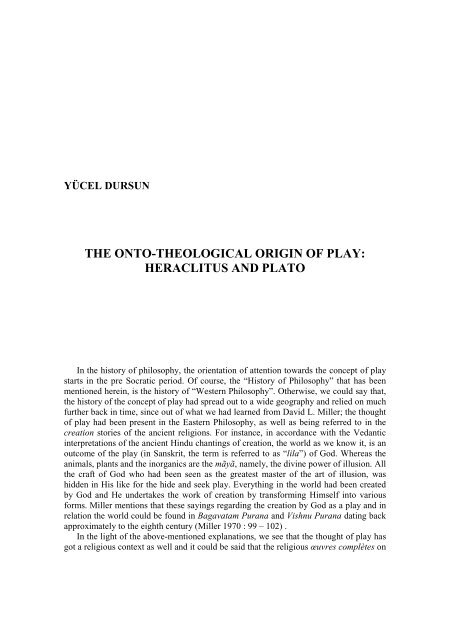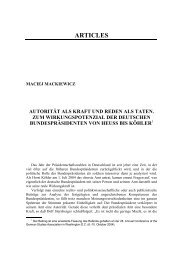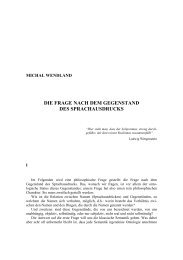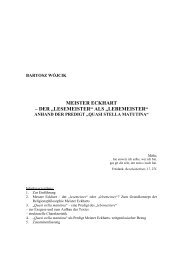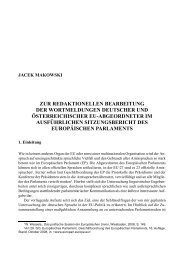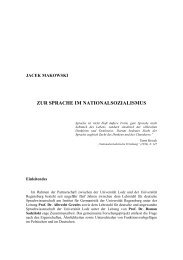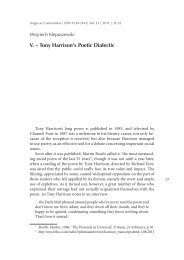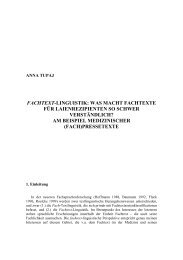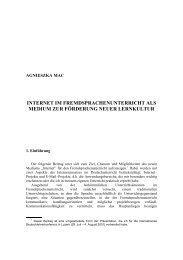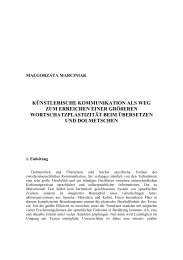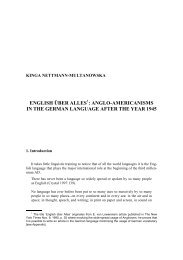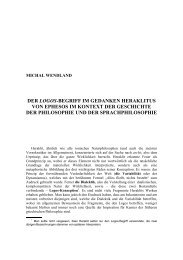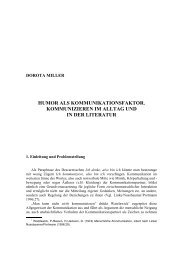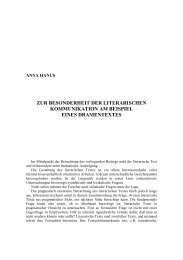THE ONTO-THEOLOGICAL ORIGIN OF PLAY: HERACLITUS AND ...
THE ONTO-THEOLOGICAL ORIGIN OF PLAY: HERACLITUS AND ...
THE ONTO-THEOLOGICAL ORIGIN OF PLAY: HERACLITUS AND ...
Create successful ePaper yourself
Turn your PDF publications into a flip-book with our unique Google optimized e-Paper software.
YÜCEL DURSUN<br />
<strong>THE</strong> <strong>ONTO</strong>-<strong>THE</strong>OLOGICAL <strong>ORIGIN</strong> <strong>OF</strong> <strong>PLAY</strong>:<br />
<strong>HERACLITUS</strong> <strong>AND</strong> PLATO<br />
In the history of philosophy, the orientation of attention towards the concept of play<br />
starts in the pre Socratic period. Of course, the “History of Philosophy” that has been<br />
mentioned herein, is the history of “Western Philosophy”. Otherwise, we could say that,<br />
the history of the concept of play had spread out to a wide geography and relied on much<br />
further back in time, since out of what we had learned from David L. Miller; the thought<br />
of play had been present in the Eastern Philosophy, as well as being referred to in the<br />
creation stories of the ancient religions. For instance, in accordance with the Vedantic<br />
interpretations of the ancient Hindu chantings of creation, the world as we know it, is an<br />
outcome of the play (in Sanskrit, the term is referred to as “lila”) of God. Whereas the<br />
animals, plants and the inorganics are the mãyã, namely, the divine power of illusion. All<br />
the craft of God who had been seen as the greatest master of the art of illusion, was<br />
hidden in His like for the hide and seek play. Everything in the world had been created<br />
by God and He undertakes the work of creation by transforming Himself into various<br />
forms. Miller mentions that these sayings regarding the creation by God as a play and in<br />
relation the world could be found in Bagavatam Purana and Vishnu Purana dating back<br />
approximately to the eighth century (Miller 1970 : 99 – 102) .<br />
In the light of the above-mentioned explanations, we see that the thought of play has<br />
got a religious context as well and it could be said that the religious œuvres complètes on
70<br />
Yücel Dursun<br />
this subject has significance from the point of view of philosophical thought. For<br />
instance, it has been known to the historians of philosophy that the philosophies of<br />
certain ancient Greek Philosophers had been affected by the ancient Greek Orphism.<br />
First and foremost, Pythagoras is provided as an example to the said affect. It has been<br />
claimed by the historians that most of the principles and beliefs of the order founded by<br />
Pythagoras had been taken from Orphism 1 . Another important example is, some of the<br />
philosophical sayings of Heraclitus, if we rely on Nietzsche. It has been asserted that<br />
Nietzsche recoursed to certain items included in the myths of Greek Orphism for the<br />
purposes of interpreting the famous 52 (B) fragment 2 of Heraclitus regarding play,<br />
especially in his book titled “Philosophy in the Tragic Era of the Greeks” (Die<br />
Philosophie im Tragischen Zeitaler der Griechen) (Miller 1970 : 187n5) . It has been<br />
mentioned that Nietzsche wanted to show that “the origin of Heraclitus' aphorism is<br />
traceable to the ancient Greek Orphic religion, whose myths include stories of their high<br />
god, Dionysos, pictured as a little child playing with toys." (Miller 1970 : 103) . In other<br />
words, it has been claimed that it is possible to make a connection between the saying by<br />
Heraclitus and certain elements of the ancient Greek Orphism, over the thought of play,<br />
through Nietzsche. Similar examples could be increased if one had wanted to; but the<br />
very self of the example contained herein, is not an example that could only be related<br />
through a religious context, but at the same time constitutes a starting point in the history<br />
of philosophy on account of the thought of play. So, since we will discuss the play<br />
concept from the point of view of its onto-theological origin or history in this essay, it<br />
will be useful to pay a little bit more attention to the 52 nd fragment of Heraclitus, which<br />
is mentioned within the said example.<br />
1. Heraclitus’s Aion and His Transformations<br />
The saying is as follows :<br />
αἰὼν παῖς ἐστι παίζων, πεττεύων· παιδὸς ἡ βασιληίη (Aion is a child playing<br />
draughts; the kingship is the child’s) (Krell 1972 : 64) . This is the translation of the<br />
fragment in Greek by Krell. There are many versions of the translation of the fragment 3 .<br />
Whereas Miller translates the sentence as “Time (aion), is a child playing (pais paidzon),<br />
moving counters on a game board. The kingdom (basileie) belongs to the child (paidos)”<br />
1<br />
See (Weber 1993 : 11 fn2) for general information on the influence of Orphic and Greek Philosophy<br />
and for Pythagoras see (Gökberk 1974 : 38).<br />
2<br />
The numbers of fragment with regard to Heraclitus and Parmenides are the numbers given by<br />
Hermann Diels and Walther Kranz in their compilation titled “Die Fragmente der Vorsokratier, griechish<br />
und deutsch”.<br />
3<br />
For example, this fragment in the texts and explanations related to the Ancient Philosophy by Kranz<br />
is as follows : “Time (aion) is a child playing and making a move with a draughtsman: the play of the<br />
kingdom of a child!” (Kranz 1994 : 64) or the translation by Diels: “Time is a child (Knabe) playing the<br />
draughts; The child regime! (Knabenregiment)” (Diels 1922 : 88). In addition there is the translation within<br />
the book by John Burnett, published in the year 1892 with the title “Early Greek Philosophy” goes like<br />
this: “Time is a child playing the draughts. The Kingly power is a child’s”.
The Onto-theological Origin of Play: Heraclitus and Plato 71<br />
(Miller 1970 : 102). The translation by Heidegger where he fed the text with his own<br />
interpretation of it is as follows: “The Geschick of being, a child that plays, shifting the<br />
pawns: the royalty of a child -that means, the arkhé, that which governs by instituting<br />
grounds, the being of beings. The Geschick of being: a child that plays". (Heidegger<br />
1991 : 113; 1997 : 169). Many more examples could have been given for the translation<br />
of the fragment. We could put together these translations in two basic categories. The<br />
first are the translations by Diels, Kranz, Burnet, etc … which we could call philological<br />
and which we have made examples of herewith, namely the ones in which not much of<br />
philosophic interpretations have been added to; and the second are the translations by<br />
Nietzsche, Heidegger, and Fink which we could call philosophical readings. When we<br />
are to consider these two categorical reading types, we find out the following: The<br />
difficulty that has been come across most commonly in the philological and even in the<br />
philosophical readings of the fragment is the translation of the word αἰὼν (aion). This<br />
word sometimes has been translated as “time” and sometimes as “life span”. There are<br />
others who has translated as “life” and “life time” as well (Rifat 2003 : 50). In The<br />
Dictionary of Philosophical Terms, F. E. Peters suggests the translations of “life span”<br />
and “eternity” for the word αἰὼν. And he claims that the difference between time as<br />
khronos which contains the past, the future and the present; and time as aion which<br />
refuses the periodical separations between the past and the future and verifies all within<br />
the present had been hinted at by Parmenides. (Peters 1967 : 7) Accordingly Peter claims<br />
that the word αἰὼν is included in a conceptual manner in Parmenides and shows his the<br />
5 th line of his 8 th fragment as the grounds for it. Although the 5 th line of Parmenides’s 8 th<br />
fragment is οὐδέ ποτ΄ ἦν οὐδ΄ ἔσται, ἐπεὶ νῦν ἔστιν ὁµοῦ πᾶν 4 and does not<br />
contain the word αἰὼν, this expression tells about the temporal condition of One, ἕν in<br />
the following line. If we take another look at the meaning of the word depending also on<br />
some of the philological readings, we could say that what has been meant by the word<br />
αἰὼν as “time” or “life time” is not the known time and the known life time, but<br />
something else is being marked by the said word. What was marked could have been the<br />
eternal and temporal condition of One from a Parmedinic point of view like it had been<br />
expressed by Peters, or could have been the being’s “modality” from a Plotinustic point<br />
of view (Peters 1967 : 8). If we are to take a look at the other words of the fragment, we<br />
could see that the others had not created such difficulties as αἰὼν and the philological<br />
translations of the expression are almost similar to each other grammatically.<br />
As for the philosophical readings of the fragment… Without doubt, one of the most<br />
important reading is the one by Nietzsche. Nietzsche’s reading had not been limited to<br />
the philological context of the expression and at the same time his interpretations had<br />
been a source of inspiration for the philosophers of the 20 th century who are also his<br />
successors such as Heidegger, Derrida, Gadamer, and Fink in their thoughts on the<br />
concept of play. Nietzsche says “According to Heraclitus, the universe (Die Welt) 5 is a<br />
4 When the expression “ἕν, συνεχές” on the 6 th line is taken into consideration, the translation by<br />
Walter Kranz is as follows: “Neither it existed for once, nor it shall exist, since there is a whole now.<br />
A wholesome thing that is one”. (Kranz 1994 : 82).<br />
5 In German, the word Welt could mean “world”, as well as the “universe” and the “cosmos”. The<br />
word Welt in German has got a wide range of meanings. For this reason all the meanings of the word<br />
Welt should be considered.
72<br />
Yücel Dursun<br />
play (das Spiel) of Zeus, or in terms that is more appropriate for physics, it is the play of<br />
fire (des Feuers) with itself; …” (Nietzsche 1954c : 374) . As it could have been<br />
understood from this statement as well, Nietzsche, matches, the word αἰὼν placed as a<br />
subject in the 52 nd fragment of Heraclitus with Zeus and with his physical counterpart,<br />
the fire. Again a little after this quotation, while he says “Äon is playing this game with<br />
himself” (und dieses Spiel spielt der Äon mit sich) (Nietzsche 1954c : 376 – 77) he is<br />
using Äon which is the German form of the word αἰὼν. Accordingly the interpretation<br />
by Nietzsche to the word αἰὼν that has been used as a subject in the 52 nd fragment of<br />
Heraclitus now should be understood as the “great child” Zeus playing (Nietzsche<br />
1954b: 826) or with an expression that is more appropriate for physics, with fire 6 . Zeus,<br />
or the “great child” 7 with attributions such as Äon, αἰὼν and fire had been made, has<br />
been playing a game with himself. And according to Nietzsche, Heraclitus is providing<br />
an answer to the question in this fragment which is in fact important and which could<br />
give an unrest otherwise: “Play” is the answer to the question “How is it possible that<br />
pure fire takes shapes that are so far from purity?” (Nietzsche 1954c : 376 – 377) . It is<br />
only with the “play” of the eternal and pure fire that the countless transformation finds<br />
its own place and multiplies itself: “Being one is at the same time being many only with<br />
this sense of the word” (Nietzsche 1954c : 374) . Accordingly the drive of play that<br />
always evokes ever new (immer neu erwachende Spieltrieb) gives life to different other<br />
worlds. The pure fire transforms itself to earth and water with this drive (Sich<br />
verwandelnd in Wasser und Erde) . (Nietzsche 1954c : 376 – 77) Along with this, these<br />
lines are not in relation to “whether this play has got a purpose or not or whether there is<br />
a target that it is directed towards or not” or “what is the aim of this great child by<br />
playing”. The quotations are more related to what the play brings, and to the thing(s) that<br />
come out along with this play. Whereas the question of why with regard to the play had<br />
been made an issue of especially by Heidegger and then later by Derrida and Gadamer<br />
from the point of view “whether the play had an aim or not”. 8 On the other hand,<br />
Nietzsche does not only stop at interpreting the word αἰὼν with these words, but at the<br />
same time brings out the deeper meaning of the fragment on the whole. The connections<br />
of “play” with “αἰὼν” and the connections of “αἰὼν” with “kingly power” and its<br />
consequences are being laid down by the above mentioned lines.<br />
When we take a look at Heidegger, we come across an interpretation that is similar to<br />
the Nietzsche like interpretation of Heraclitus’s statement. Heidegger is loyal to the<br />
interpretation of the word αἰὼν by Nietzsche. However, he also mentions that this word<br />
is another name for logos. He provides the connection of the word with logos as follows:<br />
“Only when we contemplated what logos meant for Heraclitus in early Greek thinking<br />
did it become clear that this word simultaneously names being (Sein) and ground/reason<br />
(Grund), naming both in terms of their belonging-together. Heraclitus uses different<br />
6 After Nietzsche, Eugen Fink had also pointed out that against the interpretation by Heidegger of<br />
aion as logos and physis, he insisted that this word could be comprehended best by making a reference<br />
to fire. (Krell 1972 : 65 – 66)<br />
7 Nietzsche uses the phrase “a high simile” (ein erhabnes Gleichnis) for the use of the word “child” by<br />
Heraclitus and he mentions that only in the play of the artists and children in this world there is becoming<br />
and perishing, doing and destruction, outside the moral responsibilities (Nietzsche 1954c : 376 – 77)<br />
8 And for any detailed consideration of this point, see (Dursun 2007)
The Onto-theological Origin of Play: Heraclitus and Plato 73<br />
names to name what he names logos, names which are the basic words of his thinking;<br />
physis, the emerging-on-its-own (von – sich – her – Aufgehen), which at the same time<br />
essentially comes to be as a self-concealing; cosmos, which for the Greeks<br />
simultaneously meant order, disposition (fügung), and finery which, as flash and luster,<br />
brings about a shining; finally, that which hails him as logos, as the sameness of being<br />
and ground/reason (Grund), Heraclitus names aion” (Heidegger 1991 : 112 – 113 ; 1997<br />
: 168 – 169).<br />
According to Heidegger, logos in the meaning of being and grounds belonging to<br />
each other is aion. Whereas at the same time it is cosmos and physis. So, all these names<br />
always mark the same thing, they always mark aion. Heidegger translates the word aion<br />
as “the worldly time”. Which is “the world that worlds and temporalizes in that, as<br />
cosmos” (Heidegger 1991 : 112 – 113 ; 1997 : 168 – 169) . In other words, if we are to<br />
say it in Nietzsche’s terms, the physical attribution to aion, is its way that transforms<br />
itself to earth and to water. Or it is the cosmos that appears, takes shape and becomes<br />
worldly as temporal and physis. All of these are one and the same thing. If we are to<br />
dwell upon this shortly, it will be appropriate to say a few things about logos and physis<br />
at this point. First and foremost, in the Heidegger meaning of the word, as it had been<br />
known earlier on, it is no more enough to get logos only as “the word and the reason”<br />
and physis only as “the nature”. There is a new point of view required for these<br />
meanings of logos and physis or if we were to speak in Heidegger’s terms, it is required<br />
to “listen” to “the conversations” of these historical concepts with a new hearing.<br />
Heidegger says, “the Greek noun logos belongs to the verb legein. It means "to<br />
gather, to lay one beside the other". (Heidegger 1991 : 107 ; 1997 : 160) . “To gather and<br />
to collect” but “to gather and to collect” what? And where? At this point another naming,<br />
physis should have been referred to. Physis is “the arising of something from out of<br />
itself”. Physis is a poiesis (creation) . Because says Heidegger, “what presences by<br />
means of physis has the irruption belonging to bringing-forth, e.g. the bursting of a<br />
blossom in bloom, in itself”. (Heidegger 1993 : 317). The thing that has been collected,<br />
accumulated, and laid on, finds the opportunity to come out from the physis, finds the<br />
opportunity to be the emerging-on-its-own (von – sich – her – Aufgehen). Physis is the<br />
one making come out and coming out, opens towards outside and makes open towards<br />
outside. It is the one that reveals its secret. For this reason, it is the one that conceals<br />
(Heidegger 1991 : 64 – 65 ; 1997 : 94 – 95) . It is what shelters such an possibility. At<br />
the same time, “to provide the possibility for becoming is what legein and logos words<br />
want to say” (Caputo 2002 : 433) . Accordingly logos and physis name the same thing<br />
from this point of view. “the one making itself lay forward, the one that lays one beside<br />
the other, the one making itself the emerging-on-its-own” and the one “that plays” are all<br />
one and the same thing. Accordingly Heidegger, demands us to think of Heraclitus’s<br />
αἰὼν‘s in the light of these said meanings.<br />
Heidegger does not stop at this point and adds one more name to the names of aion: The<br />
Geschick of being. He makes a connection between the “child” in the fragment of Heraclitus<br />
and the “child playing” with the same thing. “The Geschick 9 of being: a child that plays" and<br />
9 The word Geschick used by Heidegger means “fate, destiny” as well as “skill” in the German<br />
language. And it also has the meaning of “sending”. By some of the interpreters it had been translated as<br />
“mission” (Caputo 1986 : 73). Accordingly, all these meanings have to be taken into consideration.
74<br />
Yücel Dursun<br />
on top of it "[this] the greatest royal child is that mystery of the play in which humans are<br />
engaged throughhout their life, that play in which their essence is at stake.”. (Heidegger 1991:<br />
112 – 113 ; 1997 : 168 – 169) . The Geschick of the being, being a child showing the skill of<br />
playing, is more or less within a quality that explains why “the kingship is belonging to the<br />
child”. Because there remains simply a play and this ““simply” (nur) is everything, the one<br />
and the only” (Heidegger 1991 : 112 – 113 ; 1997 : 168 – 169). The child that plays “only”<br />
this game is this royal child. After such an interpretation has been brought for the beginning<br />
and the end of the fragment, what remains is the following question that we have mentioned<br />
above: “Why does it play, the great child of the world play (Weltspiel) Heraclitus brought<br />
into view in the aion?”(Heidegger 1991 : 112 – 113 ; 1997 : 168 – 169) . The answer has<br />
been provided by Heidegger in the most clear manner: “The "because" withers away<br />
(versinken) in the play. The play is without "why". It plays since it plays” (Heidegger 1991 :<br />
112 – 113 ; 1997 : 168 – 169). The reason of the playing of this play is without “why”.<br />
Because, “because” is embedded in the play. Heidegger says that the play is without why but<br />
at the same time he also says that “Nothing is without ground/reason”. (Heidegger 1991 : 112<br />
– 113 ; 1997 : 168 – 169). So what is the relationship between the grounds (Grund) and the<br />
play? The question is important and Heidegger gives the answer to it in his work, Der Satz<br />
vom Grund. But for the time being, under the present we could say that for Heidegger, as it<br />
had been for Nietzsche, this fragment of Heraclitus has become a milestone in their thoughts<br />
on play.<br />
We should mention that the interest of Heraclitus in play other than the 52 nd<br />
fragment, is the 70 th fragment. This fragment is also related to play just like the 52 nd<br />
fragment. The fragment is as follows : “Παίδων ἀθύρµατα νενόµικεν εἶναι τὰ<br />
ἀνθρώπινα δοξάσµατα.” And the translation by Kranz of this fragment is “the<br />
child’s play (according to God) is the thoughts of the human beings” (Kranz 1994 : 66) .<br />
Another translation is “he used to call the human thoughts, a child’s play 10 ” (Rifat 2003 :<br />
57) . Of course this saying by Heraclitus is to point out that the human thoughts are also<br />
a play. Along with this, Krell conveys as follows while he is interpreting Heidegger, to<br />
tell the relationship between Aion’s play and the play of the human thoughts: "if one<br />
thinks logos as the relation of man and Being, then his thought approaches the wisdom<br />
of the playing child. His thoughts are indeed 'the playthings of children'." (Krell 1972 :<br />
65 – 66) . So, the playful relationship between the humanly play and “that great child”<br />
could be formed by logos that we have mentioned above in the Heidegger’s meaning of<br />
it. This playful relationship especially between being (Sein) and Dasein, had been<br />
examined deeply by Heidegger. 11<br />
Now we could take a look at the philosophy of Plato since it provides important tools<br />
both in this connection and in our examination of the play and its onto-theological<br />
origin.<br />
Especially if we look at it from the point of view of the interpretation that has been brought to the<br />
fragment, both of the meanings of the word as “fate” and as “skill” should be thought of simultaneously.<br />
10 Here ἀθύρµατα comes from the root of ἀθύρω (I am playing) and expresses playing with a few<br />
little differences as παίζων, παίζω (I am Playing ) in the 52 nd fragment. While the former has got<br />
meanings such as “play something”, “play a game” , “entertain himself”, the latter has got meanings such<br />
as “to play like a child”, “to dance”, etc …<br />
11 The relevant section can be found in (Dursun, 2007)
The Onto-theological Origin of Play: Heraclitus and Plato 75<br />
2. Plato and Human as a Puppet<br />
We all know what a playful writer Plato was. Both the styles of his texts and the<br />
figure of Socrates craftily beats up his rivals in his dialogues or his justification<br />
represented in a playful style could be seen as the proofs of this. The playfulness of Plato<br />
had not been limited to the texts he had written; at the same time he had provided a<br />
certain place for the concept of play in his philosophical scheme. Two concepts are<br />
important in Plato’s relationship with the concept of play. One of them is the concept of<br />
µίµησίς (imitation) and the other is θαῦµα (the puppet) . There is a play between the<br />
man and God or the Gods and the concept of µίµησίς (mimesis) had taken place on the<br />
side of the man, wheras the concept of θαῦµα (thauma) had taken place on the side<br />
related to the God. On the one hand man is θαῦµα (thauma) in his relationship with<br />
God, namely his plaything, his puppet. On the other hand, the man who is the puppet or<br />
the plaything, is not at all completely lacking the “will power” . Plato explains the<br />
condition of the plaything or the puppet being active in Laws as follows : “Let us think<br />
about it like this. Let’s take it that each and every one of us, the living beings are a<br />
puppet (θαῦµα) created by God (θεῖον), this could be a plaything (παίγνιον) for them<br />
or something that has been designed seriously, we do not know that, but what we know<br />
is that these feelings inside us keep pulling us like a group of nerves and ropes and they<br />
push us towards conflicting activities since they are in conflict with each other: Here it is<br />
where we could find the distinction between virtue and evil. The reason tells us that<br />
everyone always follow one of these, never letting it go, and that one should resist the<br />
call of the other nerves …” (Plato 1998 : 644e – 645a) . As it could be seen, the puppet<br />
has the ability to be active and has got reason (λόγος) . He could make a choice with<br />
this between virtue and evil. He could take part in the play God or Gods and play with<br />
them. With it, he could be the subject of his own play. In addition to this, reason is also<br />
“the common law of the city (πόλεως κοινὸν νόµον) ” where the puppet is located<br />
(Plato 1998 : 645a) . Reason is the basic factor in the governing of the city as well.<br />
Accordingly, it is possible for the human being to be virtuous by acting with reason and<br />
to make a move in the play of Gods and this possibility shows itself in the governing of<br />
the city in accordance with the laws. All right but either a puppet or a play thing, how is<br />
the man going to play this game with the God ?<br />
As an answer to this question, Plato’s mimesis concept that we have mentioned<br />
above is important. By depending on Spariosu, Küchler says that Plato defines play as a<br />
type of “good mimesis” (Küchler 1994 : 13) . Namely, this is the man’s “being able to<br />
establish the connection with the divine by representing the higher play of Gods”<br />
(Küchler 1994 : 13). Man “should live in compliance with his role and by playing the<br />
best games possible” (Plato 1998 : 803c) . This is the thing making him free and active.<br />
And its realisation could be possible by mimesis. From this point of view Plato makes<br />
the Athenian talk as follows : “Whereas, our order of state is the imitation (µίµησίς) of<br />
the best and highest way of life.” (Plato 1998 : 817b) . The building up of the ideal state
76<br />
Yücel Dursun<br />
and the ideal governing of a city shall be possible with the imitation (mimesis) 12 of the<br />
best and highest way of life. Man in accordance with his nature of which “a big part is a<br />
puppet and some part has got the share of reality” (Plato 1998 : 804b), could set up his<br />
ideal state with the help of this mimetic play which he plays with God using his reason.<br />
For this purpose what he has to do is to imitate the “ideal” in a playful way. Namely<br />
from one hand he has to play games, sing songs and dance (Plato 1998 : 803c). By doing<br />
so, he is not only going to take the Gods to his side but; at the same time humans thanks<br />
to the “melodies that have been good imitations”, “shall follow such imitations on the<br />
way of acquiring virtues” (Plato 1998 : 812c) . They will render themselves freedom<br />
from the captivity of those ropes by going through a period of refining by good<br />
melodies. And in this way, the virtuous citizens, could have lead lives slightly getting<br />
free of being the puppet whose strings are pulled and who is dependent on them, and<br />
would have made correct moves. On the other hand, in this “imitation of the best and the<br />
highest way of life” “a correct direction should be given that is specifically arousing the<br />
desire towards the thing that requires the virtue of his work for becoming a perfect man<br />
in his adult ages with his soul” for the child who is at the age of playing (Plato 1998 :<br />
643c-d) . This is the education (παιδεία). Education has got a close relationship with<br />
play in the setting up of the ideal state. The education should also be play–like: Plato<br />
says in the State; “You should provide the education to be a play for them. Accordingly<br />
you will see better what they are inclined to from their nature” (Plato 1971 : 537a) . For<br />
Plato it is important that the child should be located in a position for the future that is<br />
compatible with his nature. Because virtue is on the other hand, everybody doing his<br />
own job. The citizen to be positioned in accordance with his work. A play–like education<br />
will put the child in a mould that he is going to be living in, in the future. On this subject<br />
Toker says the following : “In that case, play in Plato is a tool to put someone into a<br />
certain condition of soul and body, it is the ambiance to put someone into a certain shape<br />
that could handle a feeling and an action. Play is a process of shaping a citizen for<br />
rendering the action that he is inclined to from his nature in compliance with the purpose<br />
of perfection” (Toker 2005 : 11) .<br />
Along with this, play in the Platonic sense, is the way of providing the conditions for<br />
making correct moves in the play that the puppet or the man is playing with God or<br />
Gods. It is the possibility for making independent moves excluding the things that<br />
condition him. The realisation of this possibility is in a mimetic style. Because what is<br />
ideal has got an ontology and this ontology could be served as a guide for the correct<br />
moves of the man. The style of playing that has been suggested by Plato for the puppet is<br />
in respect of the guidance of this ontology. In that case, he plays and joins the play of<br />
12 Meanwhile it shall be useful if we take a look at the concept of mimesis. According to Spariosu,<br />
“the Greek word mimesis (as well as its older relatives, mimos, mimeisthai, and mimema) is as a rule<br />
associated with modern concepts of imitation and representation, but this connection is by no means<br />
certain before Plato.” (Spariosu 1989 : 17). Spariosu would want to give some of the meanings existing in<br />
the concept of mimesis up to the time of Plato, by depending on Gerald Else. These are similes such as<br />
hand and face movements that we call mimics (we should also add the sounds to these) in our language<br />
as well. Another part of them is one person imitating the other without the mimics. Whereas the other part<br />
is the multiplication of signs and characteristics of things and individuals. The claim of Spariosu is his<br />
initiative to redefine the meaning and functioning of this concept of Plato “with rational terms” (Spariosu<br />
1989 : 18). In other words, not an “involuntary or semi – voluntary, self-formed” imitation, Platonic<br />
mimesis is an imitation and representation where reason itself is in effect.
The Onto-theological Origin of Play: Heraclitus and Plato 77<br />
Gods, because he, as long as he plays with his reason, becomes independent of the<br />
pleasures and pains that captivate him and he becomes “self sovereign” (Plato 1998 :<br />
646a). To play with a style that contains reason is “become a perfect citizen on the way<br />
to virtue, starting from childhood” (Plato 1998 : 644a) and this is possible by imitating<br />
“the ideal” on this path. Accordingly the reasonable mimetic play that the puppet, the<br />
plaything or the man plays, is from another angle something that brings him above the<br />
Gods that he plays the game with. And from this point of view, “this is his most superior<br />
side” (Plato 1998 : 803c) .<br />
3. To Conclude<br />
As it can be seen, the understanding of play of Plato, is not entirely detached from<br />
the understanding of play of Heraclitus. There is a play and this play’s subject is Aion in<br />
the Heraclitus’s meaning, and Theion in the Platonic sense. At this point, it is useful to<br />
speak about the onto-theology of play. Because in the Platonic sense, the things we have<br />
mentioned above form the context of the concept of onto-theology widely used in the<br />
20 th century. According to this, play is related to theos and theion on the one hand, and<br />
on the other hand this relation also has an ontological side. When Küchler took a look at<br />
the relation of thauma with theos or theion from an ontological point of view, he makes<br />
an issue of whether in play, autonomy and presence is in the reach of the human subject<br />
or not (Küchler 1994 : 13). As it has been pointed out by this question also, what is<br />
present here is the existential relation of the thing that conditions the doings of the<br />
human subject with that subject.itself Accordingly, the issue could be formulated again<br />
from the “onto” point of “onto theology” as follows : Where does the play takes place?<br />
In other words, where is the play-space and what is the ontology of this space? The<br />
establishment of this ontological condition is important since all the praxis of man in his<br />
relation with play, is within a defined relationship with that ontology. And the man’s<br />
theoria which is a close relative of that praxis is included in this defined relationship.<br />
From this point of view, perhaps all of the human doings is in a defined relationship with<br />
this ontology and it becomes naturally important whether the man is passive, active or in<br />
any other position in this defined relationship.<br />
So, from this point of view, when the conception of Platonic play is taken into<br />
consideration along with Heraclitus, the Platonic understanding of play is an important<br />
mile stone in general terms in the onto-theology of play and in specific terms in the<br />
ontology of play.
78<br />
References<br />
Yücel Dursun<br />
BURNET John, Early Greek Philosophy, New York, The World Publishing Co., 1968<br />
CAPUTO, John D. “Postmetafizik Bir Rasyonaliteye Doğru” (Toward a Postmetaphysical<br />
Rationality), İnsan Bilimlerine Prolegomena, (Ed.& Tr. Hüsamettin Arslan), İstanbul,<br />
Paradigma, 2002: 413-447<br />
CAPUTO, John D. The Mystical Element in Heidegger’s Thought, New York, Fordham University<br />
Press, 1986.<br />
DIELS, Hermann, Die Fragmente der Vorsokratiker, griechish und deutsch, Berlin,<br />
Weidmannsche Buchhandlung, 1922<br />
DURSUN, Yücel. The Ontological Status of Play: Heidegger, Derrida, Gadamer and Huizinga<br />
(Oyunun Ontolojik Durumu: Heidegger, Derrida, Gadamer ve Huizinga), Unpublished<br />
Doctoral Dissertation, Hacettepe University Philosophy Department, Turkey, 2007 (estimated<br />
date)<br />
GÖKBERK, Macit. Felsefe Tarihi (History of Philosophy), İstanbul, Bilgi pub., 1974<br />
HEIDEGGER, Martin. “Question Concerning Technology” in Basic Writings (Ed David F. Krell)<br />
1977, 1993<br />
HEIDEGGER, Martin. Der Satz Vom Grund, Frankfurt am Main, Vittorio Klostermann, 1997<br />
HEIDEGGER, Martin. The Principle of Reason (Tr. Reginald Lilly), USA, Indiana University<br />
Press, 1991<br />
KRANZ, Walther. Antik Felsefe (Ancient Philosophy), İstanbul, Sosyal Pub., 1994<br />
KRELL, David, Farrel. “Towards an Ontology of Play: Eugen Fink’s Notion of Spiel”, Research<br />
in Phenomemology, 2, 1972: 63-93.<br />
KÜCHLER Tilman, Postmodern Gaming: Heidegger, Duchamp, Derrida, New York, Peter Lang<br />
Publishing, 1994<br />
MILLER David L., Toward a Theology of Play: Gods and Games, Ohio, The World Publishing,<br />
1970<br />
NIETZSCHE Friedrich, Werke in drei Bänden. Band I, Herausgegeben von Karl Schlechta,<br />
München, Hanser, 1954a.<br />
NIETZSCHE Friedrich, Werke in drei Bänden. Band II, Herausgegeben von Karl Schlechta,<br />
München, Hanser, 1954b.<br />
NIETZSCHE Friedrich, Werke in drei Bänden. Band III, Herausgegeben von Karl Schlechta,<br />
München, Hanser, 1954c.<br />
PETERS, F.E., Greek Philosophical Terms: A Historical Lexicon, New York, New York<br />
University Press, 1967<br />
PLATON Devlet (Republic) (Tr. Sabahattin Eyüboğlu, M. Ali Cimcoz), Ankara, Remzi Kitabevi,<br />
1971<br />
PLATON. Yasalar (Laws) Vol I-II. (Tr. Candan Şentuna, Saffet Babür), İstanbul, Kabalcı Pub.,<br />
1998<br />
RİFAT, Samih. Herakleitos, İstanbul, YKY pub, 2003<br />
SPARIOSU Mihai I., Dionysus Reborn, London, Cornell University Press, 1989<br />
TOKER Nilgün, “Oyuna girme-Oyunu seyretme: Platon’a karşı Aristoteles” (Entering to Play –<br />
Contemplating Play: Aristotle versus Plato), Toplum ve Bilim, 103, 2005: 7-20<br />
WEBER, Alfred. Felsefe Tarihi (History of Philosophy) (Tr. H.Vehbi Eralp), İstanbul, Sosyal<br />
pub., 1993


